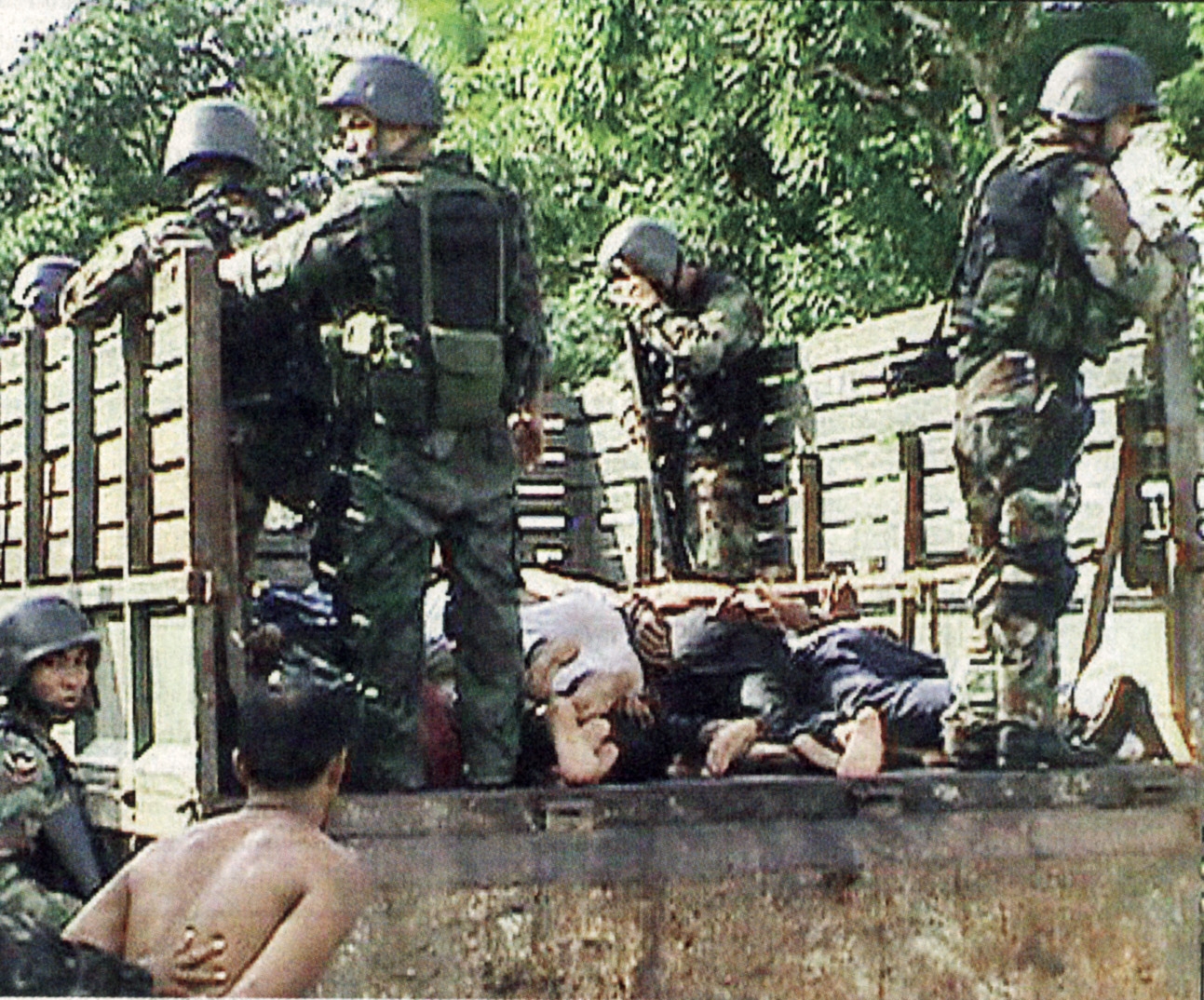Today, the Narathiwat Provincial Court handed down a landmark decision, nearly 20 years after the violent suppression of a peaceful protest in Narathiwat’s Tak Bai district in October 2004. The Court acknowledged that there is sufficient evidence in the case to require putting seven former high-ranking military officials, police officers, and administrative authorities’ officials responsible for crowd control and the transport of protesters on trial.
“This is a historic step towards justice, but just the beginning of a journey for accountability after a long delay and we are up against time,” said Melissa Upreti, ICJ’s Asia-Pacific Regional Director.
In April this year, with only six months left before the 20-year statute of limitations expires on 25 October 2024, 48 victims and the families of those killed decided to take the case directly to court, instead of waiting for the authorities to initiate criminal proceedings.
Charges against the seven include murder under Section 288 of the Criminal Code, as well as offences related to depriving people of their liberty, resulting in death or grievous bodily harm of those detained, under Section 310 paragraph 2 of the Criminal Code.
“The Thai Government was repeatedly urged, including by the ICJ, to conduct a prompt, effective, impartial and independent investigation into the potential criminal liability of all those involved in this incident — which culminated in the deaths of 85 people — including commanding officers involved in dispersing the protest, and in the subsequent detention, transport, unloading, and deaths and injuries of some of those arrested. However, the Thai authorities had thus far failed to do so. This historic moment was driven by the victims, their families and civil society, who could no longer wait for the authorities and stood up courageously to fight against impunity.”
On 25 October 2004, over 1,500 protesters gathered in front of the Tak Bai police station, demanding the release of six detained village defence volunteers. As tensions escalated, security officials used live ammunition to disperse the crowd, resulting in the deaths of seven protesters. Approximately 1,300 others were detained, inhumanely piled on top of each other in army trucks with their arms tied behind their backs, and transported in that condition for approximately 150 kilometers to Ingkayuthaborihaan Army Camp in Pattani province. When the men were unloaded from the trucks several hours later, 78 were found dead and more than 30 were seriously injured.
However, pursuant to section 95 of the Criminal Code, even the decision of the Narathiwat Provincial Court will not prevent the statute of limitations from taking effect, thereby precluding the possibility of bringing those responsible to justice. The only way of avoiding this is for each alleged perpetrator to be brought before the Court by 25 October 2024.
“We urge the Thai authorities to ensure that the defendants be brought to justice before the limitation period ends, so that impunity does not prevail and justice is served,” said Upreti.
The Court determined that the defendants would be summoned to present themselves to Court on 12 September 2024. For those who do not appear, arrest warrants may be issued.
Background
Thailand’s southern border provinces, known as the Deep South, include Pattani, Yala, Narathiwat and four districts of Songkhla province. The region is predominantly populated by ethnically Malay Muslims.
Simmering resistance against incorporation into Thailand by certain Malay groups erupted into an armed insurgency in 2004, resulting in the deaths of more than 7,500 people over the past 20 years.
Local NGOs continue to receive complaints of alleged human rights violations by security forces, including arbitrary arrests and detentions, extrajudicial killings, torture or other ill-treatment, violations of freedom of opinion and expression, and attacks on human rights defenders.
As with the Tak Bai case, most of these reported human rights violations have not been investigated, with perpetrators seldom held accountable, in a climate of prevailing impunity.
Under Thai law, injured persons may file a criminal case with an investigator (public prosecution) or directly file a criminal case in court (private prosecution). For the latter, the court must conduct a preliminary hearing to determine whether the case has merit, as seen in this instance.
A 2009 post-mortem inquest on Tak Bai incident by the Songkhla Provincial Court concluded that the 78 men died from suffocation but failed to fully address the circumstances surrounding their deaths. No inquest was initiated for the seven protesters who were killed on the day of the protest.
Despite the establishment of a fact-finding committee and compensation for victims and their families in this case, justice has not been served.
Charges were brought against nine defendants, but the judges ruled that there is merit only for seven of them.
Full statement is available for download in English and Thai
Contact
Melissa Upreti, Regional Director, Asia and the Pacific, e: melissa.upreti@icj.org
Sanhawan Srisod, Associate International Legal Adviser, Asia and Pacific Programme, e: sanhawan.srisod@icj.org





